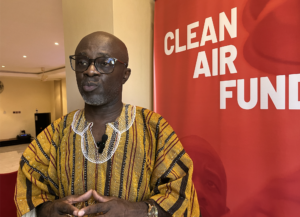Policy makers asked to address air pollution in Ghana through deliberate interventions

Mr. Desmond Appiah, Country Lead of Clean Air Fund (CAF), has urged policymakers to implement deliberate measures to address air pollution.
This was because the matter had become a significant and growing public health challenge linked to numerous deaths and diseases.
Mr. Appiah made the call at a national dialogue on clean air and election 2024 in Accra.
He emphasised that air pollution was apolitical and disproportionately affects vulnerable groups, especially children and the elderly, urging political leaders to prioritize and take proactive steps to tackle the issue.
“This is the only way to make gains, improve public health, mitigate climate change, and assure a better quality of life for all.”
The meeting sought to offer political party representatives the opportunity to share with the public their plans to ensure clean air, which is a fundamental human right.
It was on the theme “Unifying for Clean Air.”
Mr. Appiah pointed out that a review of political manifestos since 1992 showed no intentional focus on addressing air pollution.
He highlighted key pollution sources in Ghana, such as transportation, waste burning, use of hardwood as household energy and for cooking, burning of fossil fuels for power, farming practices and industrialization, stressing that deliberate actions were necessary for clean air and sustainable development.
“The outcomes of studies in Ghana indicated that there is little demand for clean air by the public, there is expressed political aspiration but the implementation of deliberate interventions to tackle the sources are generally missing,” he said
Dr. John Kingsley Kurugu, Executive Director of the Environmental Protection Agency (EPA), revealed that air pollution levels in major cities like Accra, Kumasi, Tamale, and Takoradi exceed national standards.
He stated that the impact of climate change contributed to air pollution by increasing dust generation due to prolonged dry spells.
Dr. Kurugu said that short-term exposure to high pollution levels leads to health issues, disease burden, and mortality.
While Ghana has some regulatory frameworks, he urged political leaders to prioritize a specific air pollution policy, noting the economic cost of pollution in Accra and Kumasi was estimated at $264 million annually.
Source: GNA
